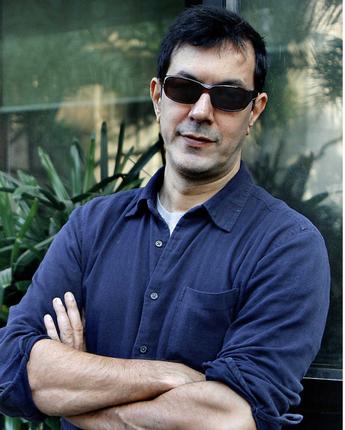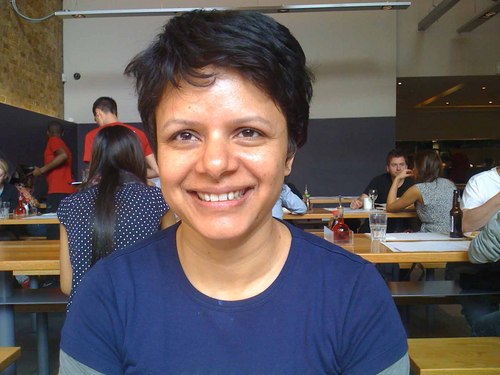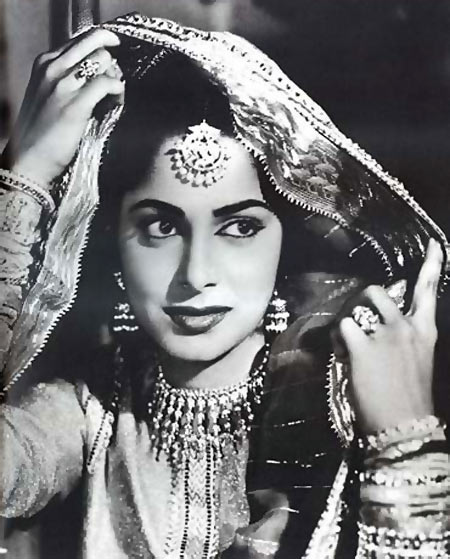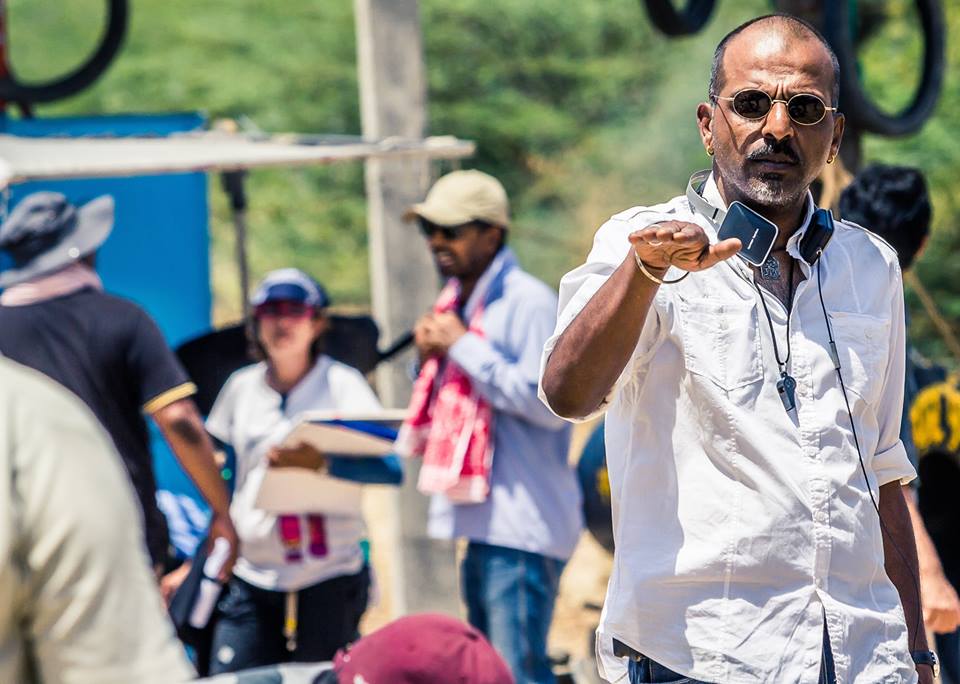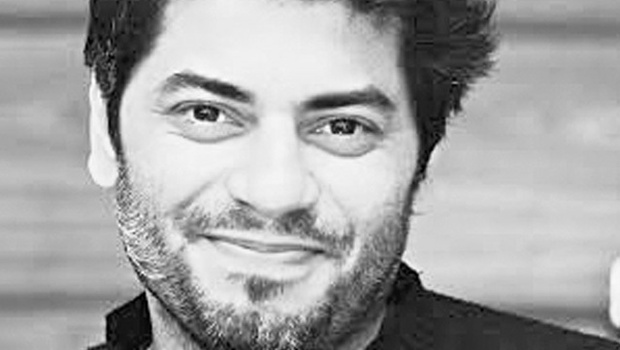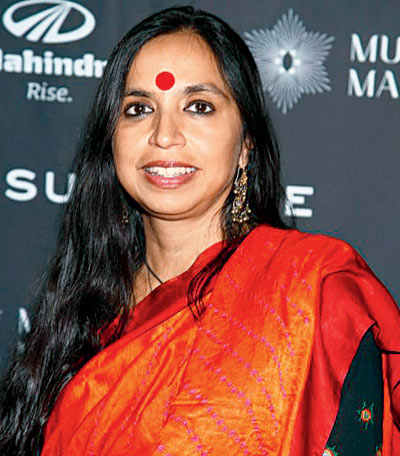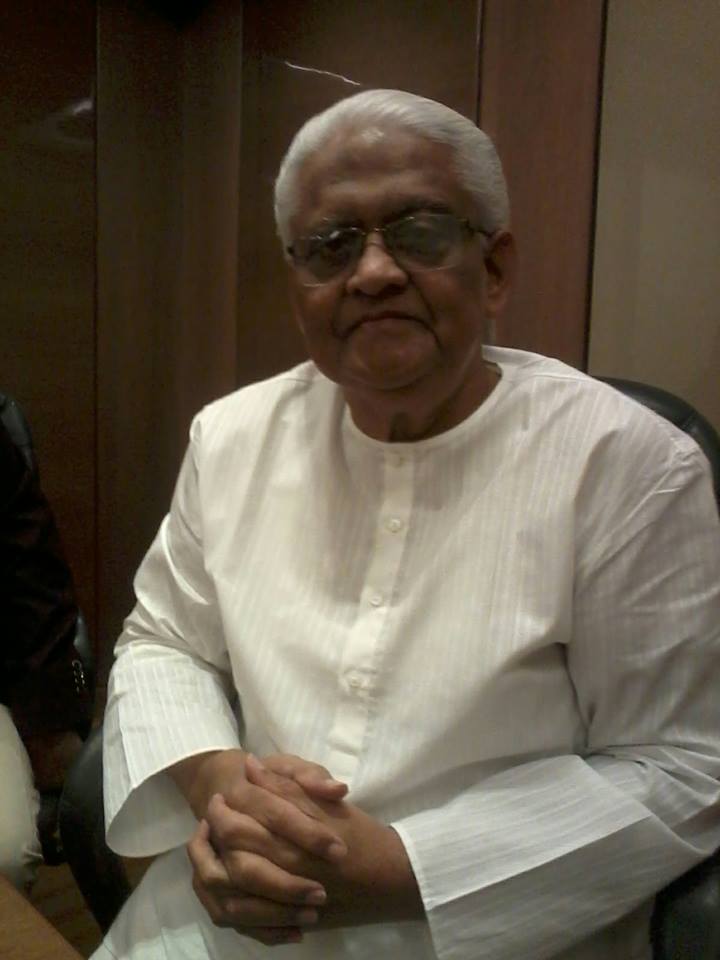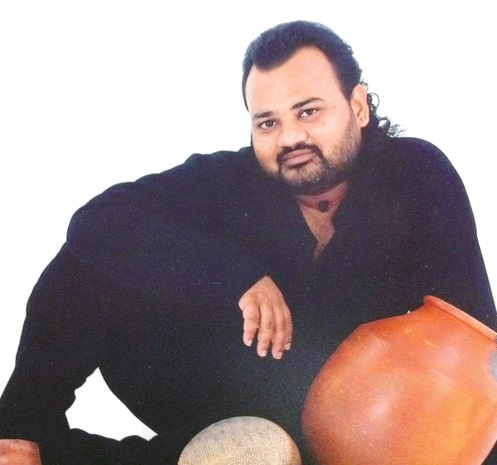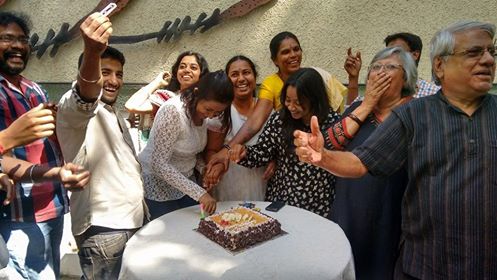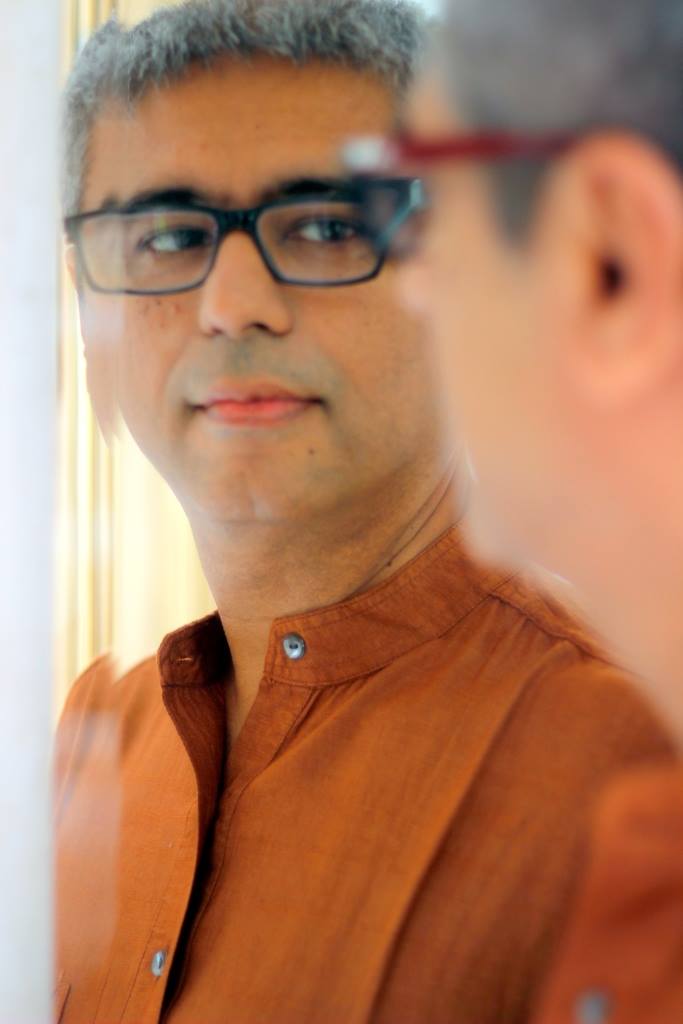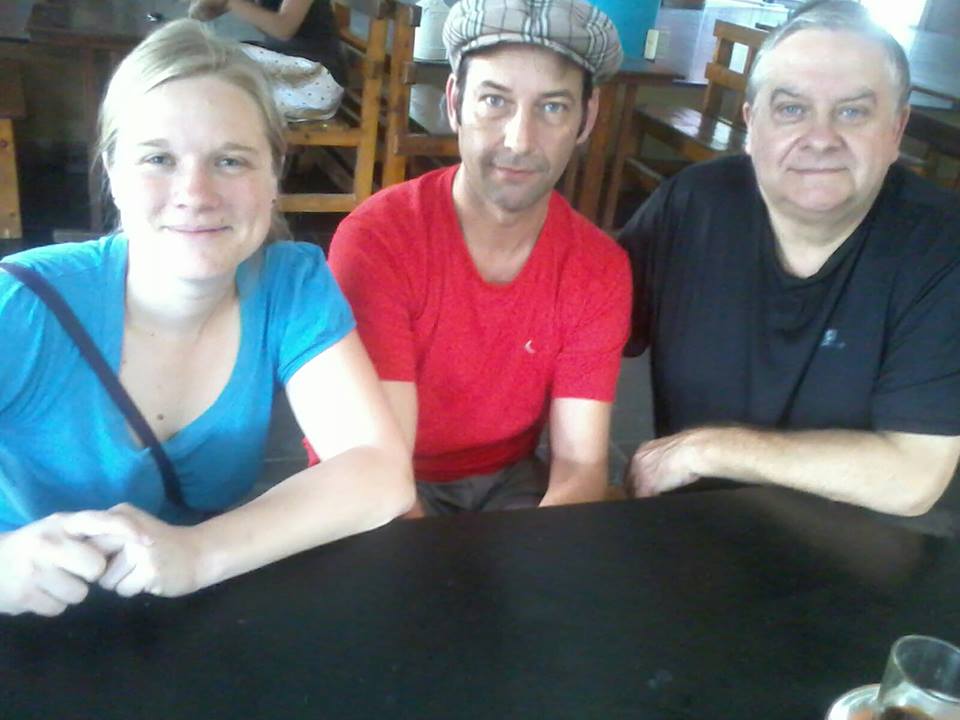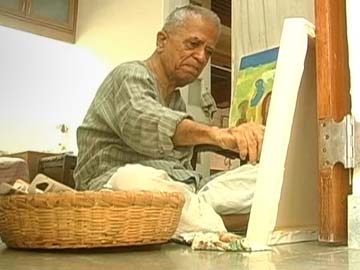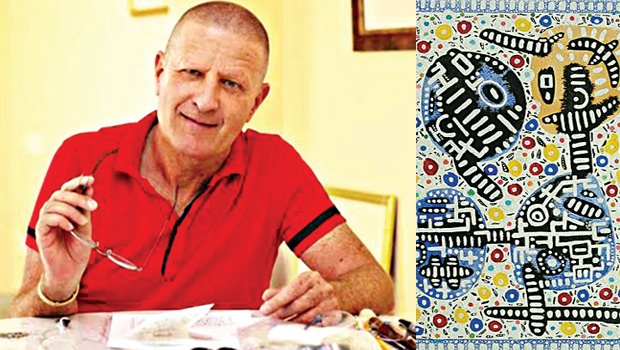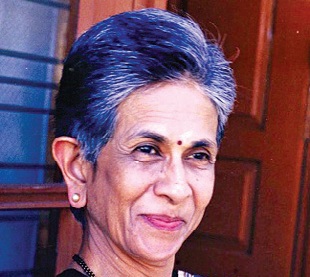Rajat Kapoor: A Sudden Shower
It is the season of awards in the Hindi film industry and it isn’t often that small films get their own share of confetti and applause on podiums reserved for glistening blockbusters. But director and actor Rajat Kapoor and the Ankhon Dekhi team were taken by surprise when their little film with a big heart garnered eight nominations at the 2015 Screen Awards. He says, “Well, yes, we were surprised that Ankhon Dekhi was nominated in eight categories because normally these awards are pretty filmy, where only box office success and big stars are recognised…so, the initial reaction was one of shock. The award function was like they all are — badly written, boring and loud! However, Ankhon Dekhi won the award for Best Story. Seema Pahwa won in the Best Supporting Actress category and the film also won another award for Best Ensemble Cast. The team was pretty thrilled.”
Meenal Agarwal: Imaginer Of All Things
Working with acclaimed art director Suzanne Caplan Merwanji (whose work in Farhan Akhtar’s film Dil Chahta Hai gave Hindi cinema, a new design template) in the capacity of a photographer, Meenal Agarwal never really thought she would get sucked into the world of creating multi-dimensional cinematic contexts. Contexts where stories can live, breathe and unfold for a limited period of time as they are being filmed but then are imprinted forever on celluloid memory. But soon enough Meenal fell heart first into production design. Cinephiles will remember the cluttered apartment she created for Mixed Doubles (2006), husband Rajat Kapoor’s funny and slightly disturbing take on marital ennui. Her more recent work in Rajat’sAnkhon Dekhi and Yashraj’s clutter-breaking production Dum Lagake Haisha, has offered wonderful insights into lives that don’t smell of varnish.
Waheeda Rehman: ‘Don’t Struggle Against The Inevitable’
In a chat, she relived the nostalgia of another time when life and cinema were simple and full of innocence.
Sudip Sharma: NH10 Addresses Caste Politics
Sayani Gupta is the young, brave, literate face of Hindi cinema. Someone who is keenly interested in the craft of acting. The actor who starred most prominently in Tasher Desh in 2012 and recently in Margarita, With a Straw, will also appear in an important role in Anurag Basu’s forthcoming Jagga Jasoos. She spoke to us about her unusual career choices.
Sridhar Rangayan: Of Rainbows And Purple Skies
Sridhar Rangayan, a profound thought leader of the LGBT movement and a conversation starter as far as gay rights go in India, was in town. When the award-winning filmmaker, editor of India’s first bravely gay magazine Bombay Dost, founder member and trustee of The Humsafar Trust, the first gay NGO in India, and the director of the Kashish Mumbai Queer Film Festival looks back, he can barely recognise the diffident Mandya boy he once was.In the early eighties, sexuality was not discussed in conservative families. Asserting alternate sexuality was ofcourse out of the question. Rangayan recalls, “It was only when I joined IIT Bombay and later switched over to graphic designing and met other artistes that I learnt how much freedom to be true to one’s identity is afforded by the anonymity in Bombay.”
Navdeep Singh: Man Of The Moment
Director Navdeep Singh’s journey through the Hindi filmscape has been a bit like the perilous road trip in his latest film NH10. He uses words like ‘crash’ and ‘burn’ to describe the years that followed his first film Manorama Six Feet Under (2007). This moody and atmospheric interpretation of Polanski’s Chinatownwon critical acclaim but did not make much money. He then made a zombie comedy, Rock the Shaadi, which yes, ‘crashed and burnt’ and never saw the light of the day. He wanted to bring together a gangster drama set in Canada with two male stars but realised the futile naivete of trying to segue egos with commercial considerations into a film that made sense only to him and gave up. Then the idea of making a film with a strong, female protagonist came, as did a one-line premise, ‘A couple witnesses an honour killing and…’
Kalki: Margarita With A Straw Opened My Eyes
Director and writer Shonali Bose after the painfully direct Amu(2005), a film that revisited the 1984 Sikh riots, is back with another story that is close to her heart. Margarita With A Strawdraws from a personal tragedy and also the life of a close relative who suffers from Cerebral Palsy ( A group of permanent movement disorders). The Kalki Koechlin starrer has been received well at international film festivals and will be released across India on April 17. Kalki speaks to us about her journey into the spirit of Laila, the spunky protagonist of Margarita With A Straw.
Read the full interview here….
Atul Mongia: Preparing The Actors
He is the casting director of films like Lootera, Shanghai, Shor in the City, LSD and more. And also the man who has created extensive workshops for the cast of NH10, Detective Byomkesh Bakshy, Daawat-E-Ishq, Queen, Ladies vs Ricky Bahl and counting. In an industry largely driven by stars, he is a technician who shapes a film’s character, tunes its performers and gives coherence to its many voices. He was in Bengaluru this week to conduct an acting workshop and talked to us about why crafting actors is important.
Margarita, With a Straw continues its triumphant journey across the world, taking director Shonali Bose to assorted festival podiums and vindicating her belief in her brave, little film, again and again. In an interview, Bose recounts the loss, the pain and the cathartic emotions that led to the making of the film.
Debutant director Neeraj Ghaywan grasped that both life and death can co-exist in the same river when during a recce around the Ganges, he saw loss interwoven with the infinitude of existence and hope. A man sitting still in a boat holding a shrouded baby, looking at a distance.. unable to let go. And a corpse and a crow floating together in the same current. He says, “When I saw that, I was reminded of these lines, ‘Kaga sab tan khaaiyo chun chun khaiyo maas..Do naina mat khaaiyo mohe piya milan ki aas (O crow! You may peck all the flesh on this skeletal frame of mine, spare the eyes though..for they await the arrival of my beloved).”’
These oft translated and repeated Baba Farid lines in a way sum up the story of Masaan. A film that began with the thoughts,”What if you have dealt with death all your life and are confronted by the loss of a loved one? Can love outlive life?Can death be more than just about loss?”
Shweta Tripathi : ‘I Will Never Ignore The Voice Within’
Vicky Kaushal: A Staggering Debut
During one of the many special screenings of Masaan in Mumbai, Shabana Azmi came up to Vicky Kaushal and said incredulously, “Tum kaun ho? Kya kaam kiya hai tumne! (Who are you? What an amazing job!) Come, you must meet Javed saab!’’ Javed Akhtar who was coming out of the theatre just at that moment, said the exact same thing, “Kaun ho tum bhai?” After the screening, Akhtar held Vicky’s hands and said, “Mere paas alfaaz nahin hai’’ (I have no words to describe your work). Says Vicky with a sense of wonder in his voice, “For Javed Akhtar to say..he had no words..this was a huge compliment.’’
‘Dil ki choton ne kabhi chain se rehne na diya jab chali sard hawa maine tujhe yaad kiya’
(The wounded heart restlessly aches… Whenever the wind ripples, for you…I crave)
‘Iss ka rona nahi kyun tumne kiya dil barbaad
Iss ka gham hai ki bahut der se barbaad kiya’
(I don’t mourn the fact that you broke my heart…
Just that you took too long to break it)
Only Ghulam Ali, the master of verse and melody, can miraculously fuse two couplets from Josh Malihabadi’s famous ghazal, Soz-e-Gham with another ghazal, Hum ko kis ke gham ne maara by Masroor Anwar and make them part of the same anguished whole. He can do it because he is not just a ghazal singer but a lover of poetry. Like the late Jagjit Singh, who blended two ghazals,Meherbaan hoke bula lo by Ghalib and Usski hasrat hai jisse dil se by Amir Minai in one composition, Ali can see harmony in diverse poetic pieces and knows how to play with a verse, how to tweak a sher, how to sing a ghazal like a poet. Then there is his complete mastery over not just the gayaki (classical singing) but also his audience.
Even in his seventies, Pyarelal Ramprasad Sharma of the legendary musical team of Laxmikant Pyarelal has the cherubic innocence of a child and the effusive humility of a waterfall. He was in the city to helm a musical night organised by the Rotary Club, and when he masterfully conducted a 30-piece orchestra, memories of the almost symphonic music LP gave for over 635 films came back in a rush. He was still the master of his craft, of the frenzied sweetness of Paras Mani, the melancholy of Dosti,the rollicking energy of Farz, the youthful romance of Bobby, the cult tunes of Karz, Ram Lakhan, Ghulami to hundreds of scores that are now a part of cinematic history.
Selvaganesh: The Chosen One
Read the full interview here….http://unboxedwriters.com/2015/03/selvaganesh-the-chosen-one/
The Music Of Togetherness
Musicians Roopkumar Rathod and Sunali Rathod celebrated 25 years of togetherness last December and his voice softens as he says, “It is music that brought us together…the music that we eat and breathe. And the music that we live for and will die for together. But a relationship needs nurturing, compromises, space and unconditional support. Something that we have given to each other all through.”
Anand Ji: Life And Music Must Have Balance
While Kalyanji Virji Shah passed away in 2000, Anandji Virji Shah is still doing what the duo did best — making timeless music. The composer, in his eighties now, still has a sharp memory, an unerring understanding of music and a deep, almost spiritual insight into life. His anecdotes span almost all the important decades of film music. The brothers made their film debut withSamrat Chandragupta in 1959 and went on to redefine thematic scores in the 70s and 80s with films like Don and Qurbani, made crossover albums with foreign DJs who rediscovered their funk, influenced tracks in the 90s and were even copied by The Black Eyed Peas. Excerpts from a telephonic chat with Anandji:
Vani Jairam: Gentle But Unvanquished
Finding quietude has not been difficult for this artiste, who suffered the after-effects of a great deal of opportunism in the Hindi film industry in the 1970s and chose to leave the vitiated space and carve her own niche elsewhere.
Today, Vani Jairam, who was born in 1945 in Tamil Nadu, has recorded several successful albums across different genres, performed to packed houses in India and abroad, has won the National Film Award for Best Female Playback Singer three times and has taken home numerous state awards for her work in Hindi, Tamil, Gujarati, Marathi, Marwari, Haryanvi, Bengali, Tulu, Malayalam, Kannada, Telugu and Oriya music.
From Pakistan with love
Born in New York, and brought up in Karachi and Riyadh, Sheikh is today an established Pakistani actor whose career took off with the 2008 telefilm Baarish Mein Deewar. Indian fans avidly followed her turn as a sacrificing elder sister in Maat and are now watching her play the poised Zeb in Shikkan. In an exclusive interview all the way from Pakistan, she tells us about her life and work.
Read the full interview here….
Vinita Bali: ‘How Can Filming Reality Make It Worse?’
How do global business leaders manage their time? Very efficiently, if Vinita Bali’s example is anything to go by. She graciously takes calls from unfamiliar journalists but will not agree to a random interview. She wants you to do your homework and not ask scattered questions but once she begins to talk, there is no reserve and her natural enthusiasm for the job at hand, even if it is just an interview, begins to flow just like her conversation.
They Dare You To Dream Big
An aside. Dagny Taggart, a definitive Ayn Rand heroine and possibly the first woman to run a railroad in fiction, is one of the many inspirations behind Wishberry, India’s first crowdfunding platform. Wishberry is run by two young women who are now fuelling many dreams just because they had the courage of conviction to follow their own. Anshulika Dubey, co-founder of Wishberry, was a McKinsey analyst in the US when the thought of crowdfunding unusual creative ideas prompted her to quit her job and join forces with friend and partner Priyanka Agarwal.
Wishberry, originally a bridal registry website, became an ‘online charity fundraising platform’ by 2011 and started accepting creative projects in 2012. Says Anshulika, “But by the end of 2012, we started to focus on the creative industry and stopped accepting social/charitable projects as we felt the need to empower the creative industry.”
Karen Anand: It Is All About Passion
Karen Anand looks back at her 25 years in food and the sudden surge of interest in diverse cuisines and says, “The Indian consumer has definitely evolved and has become more discerning. Exposure through travel and of course TV, has made the consumer more demanding. Of course, we still like food to be tasty and therefore expect a certain level of flavour even if that means we have to go slightly outside the parameter of what is considered authentic. What is very encouraging for an entrepreneur is that even a niche in India represents quite a large number. Success is always a high and it is of course a great reward for hard work as well as vision.”
When George Calombaris Served Wisdom
The Rajas celebrate four years of synergy
Read the interview with Jagdish and Arundhati Raja here…
”People think that the artistes are small in number and their voices and their freedoms do not count but in every society, it is the artistic freedom that is taken away and targetted first and then the common man loses his civil liberties.We are living today in a tenuous environment and everyone needs to defend free creative spaces.”
Read the full interview here …
Can Shakespeare be reinterpreted with irreverence? Can psychological drama meld into physical theatre? Can one actor play 14 characters? If you were to ask these questions to Australian theatre professional, Tref Gare, his answer would be a resounding, ‘yes.’ Gare was in India for the first time to perform in and as Kings’s Player from January 23 to 25 at Jagriti theatre. His company Eclectic Pelican is a melting pot of theatrical styles as it breaks barriers and brings the possibilities of theatre rather than its conventions to the fore.Written and performed by Gare, King’s Player was first performed in London and has toured widely across the UK, Australia and New Zealand. The play has been described as a mad romp where , “Medieval Europe, plagues, death, squalor, the occasional disembowelment and general unpleasantness form the backdrop of a moment in the life of a luck challenged vagabond actor.”
There is something about actor, director and veteran theatre exponent Aamir Raza Husain that reminds you of James Goldman’s The Lion in Winter. In the ornate coffee shop of one of the city’s oldest hotels, a beam of sunlight finds the Padma Shree awardee as he says, “I don’t always like the spotlight. And I have a bad back, bad knees and a bad temper. Not necessarily in that order.”
But the man whose Stagedoor Productions has, since 1975, performed and presented around 150 theatre extravaganzas and over 5,000 shows, has earned his impatience with populist trends, lazy actors and bad diction.
The artist who is in his mid 80s is ailing and in Ahmedabad but his works radiate his lifelong commitment to Gandhian ideals. The palette knife in a few quick strokes creates Gandhi in various contexts of the past and the present. There he is watching an urban sprawl in silence. Sharing a moment of harmony with Kasturba, picking up a handful of salt. Shah paints the shaggy shadows of three monkeys and Gandhi spinning his Charkha with deliberate economy. The technique is minimalistic but the resonance of the imagery is sweeping as it encompasses some of the most important chapters in Indian history. But there is also a sense of loss. And for a good reason. Like the scene in the recent hit PK, where a clueless innocent learns that Gandhi is relevant only on a currency note, this show brings to focus what Gandhian philosophy has become now. An afterthought. But as curator Renu George puts it,”Haku Shah is an exception. He has not just painted Gandhi. He has lived him.” In a telephonic chat, Haku Shah’s son Parthiv elucidates the same point
In June last year, artist Milind Nayak was admitted to a hospital and till some time ago was going through dialysis.The new year he thought was a good time to leave behind the pain and start afresh. He then set about sifting through the last 15 years of his artistic and personal journey and chose 122 works that are now on display at the Rangoli Metro Art Centre till February 1. Why call the show, `Fragments from an unstructured existence?’ He smiles, “Well, because nothing in my life or my art has ever been about structure. I flit between media, between subjects to find myself. There are times when I know that a comfort zone could have served me better.” Most commercially viable art being produced today, he says, comes from `muscle memory.’
Olaf Van Cleef: A Legacy Of Beauty
Towards the end of the 19th century, Estelle Arpels, the daughter of a dealer in precious stones met Alfred Van Cleef, the son of a stone-cutter and what followed was a great love story and a jewellery design legacy unlike any other. Van Cleef & Arpels is today not just a French brand with a global recall but a space where tradition is unafraid to meet new stimuli and ideas regardless of their source. Where creativity is not just about designing glittering diamond and white gold masterpieces but self-expression. Olaf Van Cleef, the Van Cleef & Arpels scion respects his family legacy but also delves into his rich, inner life and his fascination with India to create paintings that recall aboriginal dot art and pointillism, the foil work and inlaid gems in Thanjavur creations, the water colorists of Shanti Niketan and the gentle staining of tachisme. In an interview, Olaf Van Cleef talks about his love for India’s mysticism, the painful persecution of his family and how the emotions of pain and loss can be transfigured through art. Olaf who divides his time between Paris and Puducherry, has also been Cartier’s sales associate and adviser and has worked for over 10 years in Delhi, Mumbai, Bengaluru and Kolkata.
Reclaiming Memory From Politics
What is memory? A place you no longer live in? What is history? A street that has been renamed? Are boundaries only geographical? Can they be erased and redrawn? And when memory, geography and history can all be given a political context, what do you remember? The human experience or its politicised version. Questions like these interest scholar Dr Indira Chowdhury who has initiated the Center for Public History at Srishti School of Art, Design and Technology. Formerly professor of English at Jadavpur University, Kolkata, she has a PhD in History from the School of Oriental and African Studies, London. Her book, The Frail Hero and Virile History, was awarded the Tagore Prize in 2001.
She is helming the second session of the Winter School in Oral History that began on January 6 and will continue till January 16. The theme this time is, ‘Boundaries, Politics And Narratives: The Intersection Of Oral History, Place And Memory’ and Indira says, “When there are efforts to reshape the past by the politics of the present, it is important to create spaces for those who teach and study orality, history and memory. It becomes important to explore the politics of boundaries and what it does to how we remember where we are or were.”

His Art Is His Message
If adversity challenges us to be stronger than our pain, Eby N Joseph has been there and done that. Many times over. The Kerala based artist was diagnosed with cancer and has not just survived the disease but is now helping other survivors with the one gift he has always relied on to climb out of dark places. His art.
Charles Correa: Cities Are Not Just Buildings And Streets
Iconic architect Charles Correa believes that architecture should make space for dissent, for the poor and for the invisible. Says he, “Cities are not just buildings and streets. A city is also about events, people, communities and spaces for synergy where people can meet. To register protest. To celebrate. It is synergy that makes a city come to life. You have Freedom Park here but you should have great plazas and squares…something of the scale of a Flora Fountain and Tiananmen Square.”
**
Aatish Taseer: My Father Was Killed For What He Believed






